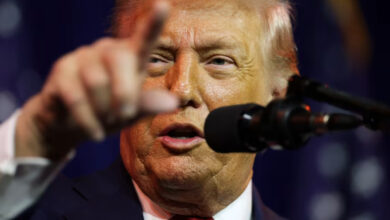
President Donald Trump managed to endorse two different losing candidates in the same Senate race, a setback that is highlighting an experience deficit within the White House political team.
“As the leader of the party, I would have liked to have had the seat,” Trump acknowledged Wednesday, a day after a special Senate election in Alabama led to the election of Democrat Doug Jones.
Republicans in Washington and around the country say a bungled approach to the race — in which the president wagered his party’s moral authority with nothing to show for it — should serve as a wakeup call for the administration going into what is sure to be a challenging midterm election year.
“This White House is not working on all cylinders,” said Ari Fleischer, who served as press secretary to former President George W. Bush.
Trump originally supported Sen. Luther Strange in the GOP primary, but he lost to Roy Moore. Trump then stuck with Moore in the race against Jones even after the Republican was hit with multiple allegations of sexual misconduct.
There is growing sentiment both inside the West Wing and around the nation’s capital that there’s a shortage of political know-how in the upper echelon of the administration. The Alabama defeat has some inside the White House hoping for a moment of reckoning with the president.
Trump may have proven the pundit class wrong with his surprise win last November, but even inside the White House there is growing recognition that Trump may need their help in office.
Trump himself was the driver of the decision to re-engage in the Alabama race on behalf of Moore, according to people familiar with the decision. He had only begrudgingly supported the Republican National Committee’s decision to pull out of the race. Some longtime aides said it was the first time they had come to question his political instincts, which served him so well in the past.
Since the summer departures of Reince Priebus and Steve Bannon, Trump has been without an in-house senior political adviser, roles filled in previous administrations by household names like David Axelrod and Karl Rove.
Trump, current and former aides said, has been focused more on shoring up his own image for his 2020 re-election than on the midterms next year. Friends and allies have sought to convince Trump of the need to invest time and resources into helping down-ballot Republicans in November, warning that Democratic control comes with subpoena power for congressional investigatory committees.
But others fault some of the president’s senior staff, including chief of staff John Kelly, who like his boss is new to politics.
When Kelly, a retired four-star general, took over the chaotic White House in August, his single-minded focus on process and order was viewed as an asset. But in the midst of a legislative crunch and with an election year on the horizon, some close to Trump have started to wish his closest adviser had a little more political know-how.
Kelly’s effort stands in contrast to that of Trump’s first chief of staff, Priebus, who was seen as more interested in trying to rein in the president’s worst instincts and fighting to preserve his own influence with the president, said people with knowledge of the White House. But Priebus, the former Republican National Committee chairman, was better equipped than Kelly to talk politics, as was Bannon, Trump’s former chief strategist, who was deeply involved in the president’s campaign.
Some in Trump’s circle see a silver lining to Moore’s loss in Alabama: Perhaps the setback will convince Trump to stop listening to Bannon, who is seen by many as a bad influence, stirring Trump’s worst instincts. Bannon strongly supported Moore’s run.
Other administration critics have pointed fingers at the White House political director, Bill Stepien, a Trump campaign veteran and former aide to New Jersey Gov. Chris Christie, for not being up to the job. But White House officials defended Stepien, saying his office is focused more on working with the RNC and Capitol Hill Republicans to implement Trump’s agenda. He is not in Trump’s inner circle of advisers, aides said, and his role is more tactical than strategic.
Stepien was not party to Trump’s decision to re-endorse Moore, people familiar with the conversation said, and has been focusing his offices’ efforts on building political support for Trump’s tax reform agenda. Much of his communication with Trump is filtered through Kelly or other aides.
Former Trump campaign manager Kellyanne Conway and Nick Ayers, Vice President Mike Pence’s chief of staff, also have political roles, officials said, but are not entrenched in Trump’s inner circle.
Outside groups wary of upsetting the administration say the collaboration with the White House is better than the nonexistent engagement at the start of Trump’s time in office, but still pales in comparison to what is needed.
Still, White House officials argued that Trump wasn’t looking for that kind of support, saying he views himself as his own chief strategist.
That has always been the case. Trump eschewed seasoned political minds during his presidential campaign, and officials said he resisted efforts by Bannon and Priebus to interject their political instincts in place of his own.




